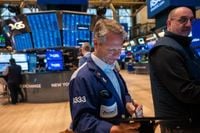Stocks experienced a mixed day of trading on May 5, 2025, as investors reacted to President Donald Trump's latest tariff announcement and awaited the Federal Reserve's upcoming monetary policy decision. The S&P 500 and Nasdaq Composite both dipped slightly, while the Dow Jones Industrial Average managed to gain ground.
The S&P 500 lost 9.60 points, or 0.17%, closing at 5,677.07, while the Nasdaq fell 39.60 points, or 0.22%, landing at 17,938.13. Conversely, the Dow rose 104.18 points, or 0.25%, to finish at 41,422.35. This fluctuation in the markets comes on the heels of a turbulent trading period since Trump initiated tariffs on April 2, which initially caused the S&P 500 to drop nearly 15%.
On May 4, Trump announced a controversial 100% tariff on all movies produced outside the United States, a move that blindsided the entertainment industry. Shares of major media companies like Disney and Netflix fell in early trading as investors processed the implications of the announcement. Disney's stock was down 1%, while Netflix saw a 3% decline. The president's declaration, made via his Truth Social platform, highlighted his concerns about foreign tax incentives luring American production away, calling it a “national security threat.”
“The Movie Industry in America is DYING a very fast death,” Trump stated, emphasizing his desire for films to be made domestically. However, the specifics of how such tariffs would be enforced remain unclear, leaving many in the industry alarmed and confused.
Amid these developments, the Institute for Supply Management (ISM) released data indicating that the U.S. services sector experienced growth in April. This news helped to somewhat stabilize market sentiment, as investors are increasingly concerned about the impact of tariffs on corporate profitability. Treasury Secretary Scott Bessent noted, "Trump's tariff, tax-cut and deregulation agenda would drive long-term investment to the U.S.," suggesting a belief that short-term volatility could yield long-term benefits.
Despite the overall market turmoil, some companies saw significant movements in their stock prices. Skechers shares surged nearly 25% after the footwear manufacturer announced it would be taken private by investment firm 3G Capital in a deal valued at approximately $9.4 billion. The deal offers Skechers investors $63 per share, representing a 27.6% premium over the stock's previous closing price.
On the other hand, Tyson Foods experienced a sharp decline, with shares plummeting 7.5% after the meat producer reported quarterly sales that fell short of analysts' expectations. Tyson reported $13.1 billion in sales for the second quarter, which was roughly in line with the previous year's performance but slightly below consensus estimates. The company's adjusted earnings per share rose to $0.92, up from $0.62 a year prior, but executives indicated that sales would be flat to up 1% for the full fiscal year, disappointing investors who had anticipated higher growth.
Wall Street is also closely monitoring the Federal Reserve's two-day policy meeting, which begins on May 6, with an interest rate decision expected on May 7. Markets are currently pricing in a total of 73 points of rate cuts by the Fed for 2025, with expectations for a potential 25 basis point cut at the July meeting. Investors are particularly interested in any commentary from Fed Chair Jerome Powell regarding the economy’s outlook amid ongoing trade uncertainties.
The S&P 500 entered this week on a nine-session winning streak, its longest since 2004. If the index can extend this streak to ten sessions, it would mark its best performance since a 12-day winning run in 1995. However, with rising concerns about tariffs and their implications for economic growth, some analysts are wary about sustaining this momentum.
Art Hogan, chief market strategist at B Riley Wealth, commented, "Nine up days in the S&P 500 is hard to maintain. We are starting to price in that eventuality of deals being announced, but we're running out of daylight on that because every week that goes by that we don't start cutting deals, we're doing economic damage."
As the week unfolds, all eyes will be on the Fed's policy decisions and any further developments regarding trade negotiations, particularly as Trump continues to assert his administration's aggressive stance on tariffs. Investors are eager for clarity on how these factors will shape the economic landscape moving forward.
In summary, while some sectors like Skechers are thriving amid significant corporate changes, others like Tyson Foods are struggling under the weight of disappointing earnings. The broader market remains in a state of flux as investors navigate the complexities of trade policies and economic forecasts.




